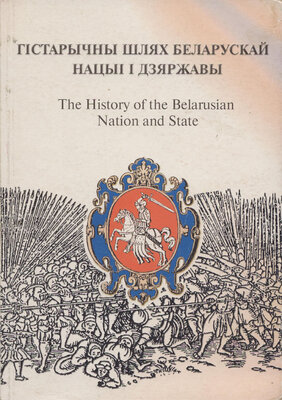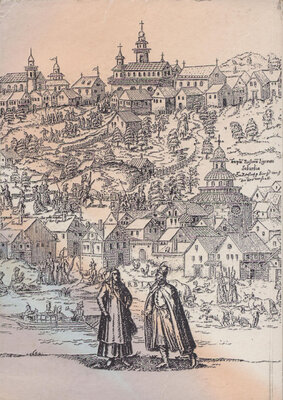Гістарычны шлях нацыі і дзяржавы
Радзім Гарэцкі, Міхась Біч, Уладзімір Конан
Выдавец: Беларускі кнігазбор
Памер: 348с.
Мінск 2001
Profound examples of national poetry, prose, and art are to be found among the Belarusian emigration as well. Alies Salavei, Natalia Arsienyeva, Uladzimir Dudzitski, Yurka Vitsbich, Anton Adamovich, Leu Haroshka, Vitaut Tumash, Uladzimir Sluchanski, Uladzimir Hlybiny, Aliaksandra Sakovich, Yauhien Kalubovich, Yazep Naidziuk, Ryhor Krushyna, Piotr Miranovich, Mikola Kulikovich, Mikola Ravienski (the composer of Belarusian anthem Mahutny Bozha (Our Powerful Lord), Elza Zubkovich, Piotr Koniukh, Mikola Strechan, and others created in the field of Belarusian culture. And today there are a number of Belarusian political and social leaders, artists, and men of science who will certainly make their place in our history.
Unfortunately, Belarusian emigration is not the event of the past but of the present as well. Belarus is exporting its intellectual potential, and this new wave of emigration seems to be mainly caused by the economic and political situation in the country. Among the latest (and let it be the last!) Belarusians who have left their home country is our well-known writer and public figure Vasil Bykau, the true honour and conscience of the Belarusian nation.
The Belarusian land has produced a number of politicians, men of science and culture, who did a great deal for the cultural and scientific development of Poland. In the days of Yahaila Belarusian and Ukrainian masters of frescoes were already exerting a crucial influence on the religious art of Poland. Belarusian roots have some of the famous Polish literary men: Frantsishak Bahamolets, Frantsishak Kniaznin, Adam Narushevich, Yulian Niamtsevich, Adam Mitskievich, Eliza Azheshka, Yuzaf Krasheuski. A composer, ‘father of the Polish opera’ Stanislau Maniuszka and a pioneer of Polish symphonic music Mechyslau Karlovich are our countrymen. The ‘father of Polish surgery’ Rafal Charviakouski and a famous mathematician Yuzef Martsinkievich are born Belarusians. While a young revolutionary, Jozef Pilsudski considered himself a Belarusian as well. Liutsyian Zhalihouski was also from ethnic Belarusian territory.
Russian culture enjoyed an even greater Belarusian influence. Our talented countrymen Ivan Fedarovich (Fiodarau) and Piotr Mstsislavets became the pioneers of printing in Moscow. The Belarusian scholar, poet, playwriter, and public figure Simiaon Polatski was a real discovery for Russia in the XVlIth century. He worked out a project for the first higher educational establishment in Russia — the Slavic Greek and Latin Academy. Simiaon’s works served as a fine example of poetry writing for the students of the Academy, among whom was also the Russian genius Mikhail Lomonosov. Polatski, being the first professional writer in Russia, took an active part in the translation of the Bible into Russian. Our highly educated countryman was a founder of the first Russian theatre. He managed to double the number of printing houses in Russia by opening a second one, private and independent from religious censorship. Compare this number to the 134 printing houses working in our country.
Muscovy and later the Russian Empire possessed its original peculiar methods of making use of the Belarusian people. Skillful, intelligent, and talented Belarusians were moved to the parent state by force. There were also the rich and dignified who accepted the Russian Tsar as their Master and moved to either Moscow or Petersburg by their own will, sometimes being invited by the new rulers. These were the different ways of taking away the best, the most intelligent, the healthiest people from Belarus.
It is not a secret any more that quite a few Russian cultural monuments were created with the help of Belarusian masters. In 1660, 68 craftsmen from Polatsk and Vitsebsk worked at the
Armoury in the Kremlin. The world famous iconostasis of Smalensk Cathedral of the Novodievichy Nunnery in Moscow was made by a master of volumetric curving (the so-called ‘Belarusian curving’) Klim Mikhailau from Shklou with other Belarusian craftsmen. Quite a few multicoloured reliefs were left in Moscow by a tiler Stsiapan Ivanau (Palubies) from Mstsislau. In the XVIIth century Belarusian tilers introduced in Moscow the production of polychromatic tiles. It was a Belarusian, Andrei Chokhau (Chekhau), who was the manufactorer of the famous ‘Tsar-Cannon’. Dependent Belarusian workers built and decorated the Tsar’s palace in Kolomenskoye, the Kremlin cathedrals and halls. Even the bas-relief of Pahonia was made in one of the Kremlin cathedrals as a reminder of the beloved Motherland.
The first Russian ballet school was founded by the serf ballet dancers Azarievich from Shklou. And as a music director of the royal theatres of Sankt-Petersburg, where Azarievich and other artists from the Shklou theatre of S. Zorych were dancing, was Vosip Kazlouski. He was a Belarusian born near Prapoisk (Slauharad), who used to work in Slonim. The author of the first fundamental History of Russia Vasily Tatishchev is also a descendant of a Belarusian prince’s kin. The Belarusians by origin were composers Mikhail Glinka, Madest Musorgsky, Igor Stravinsky (the son of a soloist of the Mariinsky theatre in Sankt-Petersburg Fiodor Stravinsky, originally from the Rechytsa District, Belarus). In addition, the popular artists Vasily Kachalov (Shverubovich) from Vilnya and Piotr Oleinikov from the Shklou District have Belarusian ancestors, the same as Dmitry Shostakovich, who was the grandson of a insurgent of 1863 Baliaslau Shastakovich from Vilnya. Sculptors Mikhail Mikieshin (the author of the monument ‘The 1000th Anniversary of Russia’ in Novgorod) and Sergey Kanionkov are from the Belarusian lands as well. The same as was a traveller Nikolay Przhevalsky (Peravalski), his followers Piotr Kozlov and Grum Grzhimailo (HromHrymaila), and exployer of the Baical Benedikt Dybovsky.
The founder of the modem soil science Vasily Dakuchaeu was from the Smalensk District, Belarus. A Belarusian by origin is the founder of the Russian school of blast-furnace workers Mikhail Kuraka; a famous lawyer Fiodar Pliavaka; the first Russian consul in Japan, the author of the first Japanese-Russian dictionary Iosif Hashkievich; the first Russian linguist to study Sanscrit, the author of Sanscrit-Russian dictionary Kayatan Kasovich; the compiler of the first dictionary of the Y akut language Edvard Piakarski; a geologist, the exployer of Siberia Yan Cherski, after whom was the mountain range and some other geographical objects named; a physiologist Branislau Viaryha; a legendary doctor Salameya Rusietskaya; a mathematician Vasil Ermakou; a physicist Aliaksandr Sadousky; a chemist Aliaksandr Viaryha; a radiochemist Vasil Baradouski; engineers and builders of Riga and Kronshtadt harbours Yan Bahinski and Yazep Zaretski; the Head of the Siberian division of the Russian Academy of Sciences Valiantsin Kaptsiuh; a geologist, the Director of the Institute of Geology of the Siberian division of the RASc Andrey Trafimuk; physicists Yakau Zialdovich and Ivan Artabalieuski.
The popular state leader of the Soviet period, the Minister of Foreign Affairs of the former USSR Andrey Gromyko was from the Vietkauski District, Homel Region. Of Belarusian descent were the famous military leaders Ivan Yakubousky, Aleksey Antonov, and Vasily Sokolovsky.
Belarusian ancestors produced a number of Russian literary men, like Fiodor Dostoevsky, Ivan Bunin, Dmitry Pisarev, Fiodor Glinka, Fadei (Tadevush) Bulgarin, Aleksandr Griboedov (from the Hrybouskis), Aleksandr Grin (from the Hryneuskis), a poet Aleksandr Tvardovsky (his father was from the Miensk district), Evgeny Evtushenko (his parents were from the village of Khamichy at Homel), Yaroslav Smeliakov, Yury Olesha, Vladimir Vysotsky (his ancestors were from a middle-class settlement in Moscow inhabited by the Belarusians since the XVIIth century), etc.
Thus, the cultural heritage of the Belarusians is of great value not only for Belarus itself, but is a considerable part of world culture. And no one knows what the spiritual achievements of our nation might have been if there had been favourable conditions for cultural development.
БЕЛАРУСЬ НА МЯЖЫ ТЫСЯЧАГОДЦЗЯУ
Гістарычны лёс не быў спрыяльным дая беларускага народа. Але ён выжыў, прайшоў праз усе выпрабаванні, не згубіў сябе, не стаў жорсткім і знявераным. Наадварот, шматлікія беды навучылі беларусаў шанаваць само жыццё і агульначалавечыя каштоўнасці. Беларускі народ захаваў моцны жыццёвы патэнцыял, незвычайную здольнасць выжываць у самых жорсгкіх умовах існавання, адраджацца да новага жыцця.
На мяжы тысячагоддзяў Беларусь ідзе па шляху адраджэння, і ніякім сілам не ўдасца яго спыніць. Наш народ з вялікімі цяжкасцямі пазбаўляецца ад рэцыдываў камунізму і залежнасці. Расце новае пакаленне беларусаў, што не зведала скалечанага савецкага выхавання, яно нясе ў сабе вобраз новай Беларусі, што зойме належнае ёй годнае месца ў Еўропе.
Ворагам беларушчыны хочацца сёння прынізіць нашу нацыянальную годнасць, пасеяць нявер’е ў здольнасць краіны да самастойнага жыцця. Але ніхто не здолее ўжо вярнуць нас у змрочнае мінулае паднявольных часоў. Беларусы маюць усе падставы верыць у лепшую будучыню, маюць магчымасць адбудаваць сваю Бацькаўшчыну як самастойную цывілізаваную дзяржаву.
3 больш як чатырох дзясяткаў еўрапейскіх краін Беларусь па асноўных паказчыках (тэрыторыя, насельніцтва, прыродныя рэсурсы) уваходзіць у першую палову. Багатыя яе лясныя, водныя, сельскагаспадарчыя рэсурсы. Беларусь мае выдатныя прыродныя ландшафты, запаведнікі, радовішчы карысных выкапняў: найбуйнейшыя ў свеце залежы калійных соляў, вялікія запасы пітной і мінеральнай вады, радовішчы нафты, вугалю, гаручых сланцаў, жалезнай руды, будаўнічых матэрыялаў ды інш.
Наша багацце і ва унікальным геаграфічным становішчы краіны ў цэнтры Еўропы. Навукоўцамі даказана: геаграфічны цэнтр кантынентальнай Еўролы знаходзіцца каля вёскі Чыжаха Бярэзінскага раёна Мінскай вобласці. Праз нашу краіну праходзяць шматлікія транспартныя магістралі паміж Захадам і Усходам. Беларусь мае развітую індустрыяльную базу, высокі навуковы патэнцыял, адукаваныя кадры. Вытворчыя сілы беларускага народа невычарпальныя.
 КНІГІ ОНЛАЙН
КНІГІ ОНЛАЙН


